Discovering who we are, who we belong to, and how we live meaningful lives.
One way to understand our identity is through our life narrative—the stories we tell ourselves about our lives. Healthy spirituality produces stories that connect us to love and belonging and support us as we explore who we are in our pursuit of a thriving life. Although spirituality reminds us that we are a part of something bigger, healthy spirituality celebrates our uniqueness and individuality in the way we contribute to the world. We are too often prone toward telling negative stories about our lives and others. Science reveals that our brains have tendencies to be oriented toward fear and shame, and this can limit our growth and connections. An important aspect of spiritual health is to intentionally consider and revise our stories to be oriented around love. Healthy spirituality pursues a lens of redemption, hope, and thriving. How do you understand your unique role in contributing to this greater story?
A curated content list
Discover more about identity and narrative

Dreaming Together: Dealing with Conflict, Finding Belonging, and Doing Justice with Rev. Dr. Alexia Salvatierra
“If your community is not well, then you are not well.” Rev. Dr. Alexia Salvatierra (Fuller Theological Seminary) is an organizer, activist, and pastor whose career has shown how individual thriving is intertwined with collective justice. With respect for marvelous human complexity, she’s encouraging us to get out of our heads and into our bodies and emotions… and is inviting us to compassion for the marginalized, and to ground our spiritual health in our connectedness to the human family, across cultural and economic lines.

Freedom from Fear: Mental Health, Justice, and Hope for an Unencumbered Life in the Black Church with Rev. Dr. Dwight Radcliff
What would it be to dream and live unencumbered? Rev. Dr. Dwight Radcliff is a pastor, community leader, and cultural theologian who wants the pages of Christian scripture to come alive to the gritty realities of justice, equity, and social transformation. Looking through the narrative vision of hip-hop and the Black church, he weaves a story of personal and communal wholeness …. holding everything together in all the tension of life … all to find thriving and spiritual health in the embodied, emotional, and empathetic now.

Getting Unstuck: Untangling the Tapestry Together (Part 2)
If our stories about ourselves are interwoven with shame, how can others provide insight to help us rewrite those stories?

Getting Unstuck: Why You Need Help to Understand Your Story (Part 1)
How do the stories we tell ourselves about ourselves help us through life's transitions? Why do we need others to help us gain insight into who we are becoming?

Identity: We Not Me (Part 3)
Identity is not just about acknowledging who we think we are, it is about listening to the voices within our communities–listening for the stories they are telling about who we are collectively.

Identity: We Not Me (Part 2)
How do our families shape our identities? By sharing our stories, or our tesimonios, we can gain insight into ourselves and communities.

Identity: We Not Me (Part 1)
What is our identity? How do we discover it? What would it look like to define our identity through the communities we participate in?

A Practice: Centering Prayer of Awareness
Awareness is a practice that allows us to train our mind and body, reorienting to the world around us.

An Integrated Life: Balancing Rigidity and Chaos
Thrive blogger, Amy Dunn, reflects on the concept of integration and how humans navigate the river of life, avoiding the rocky shores or rigidity and chaos.
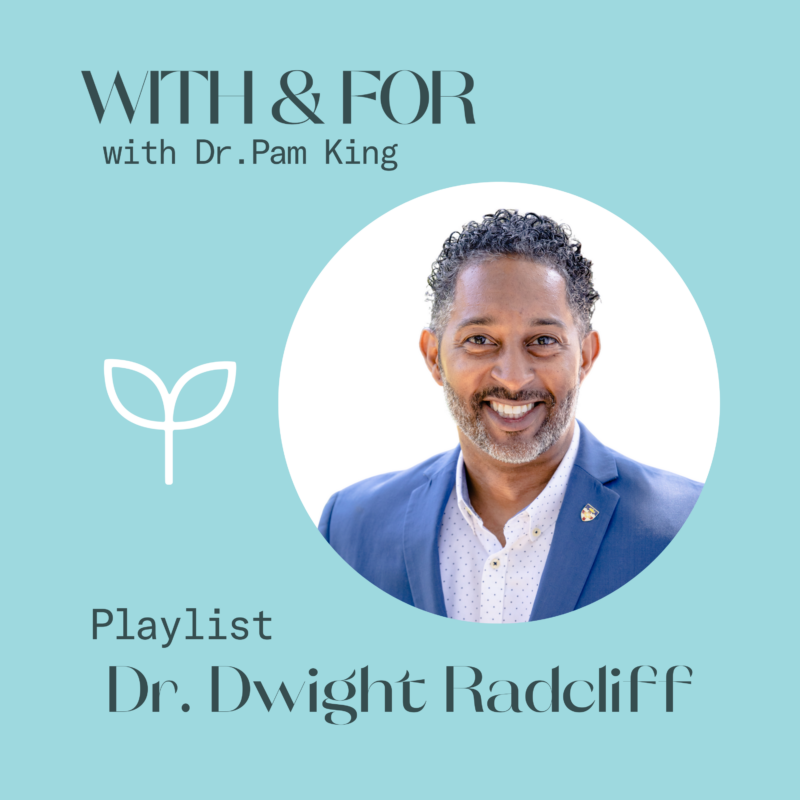
Dr. Dwight Radcliff’s Prophetic Hip Hop Playlist
Want some of Rev. Dr. Radcliff's greatest hits from the history of hip hop? Check out the playlist here!

A Broad Place: We Do Not Live in a Shoebox
Thrive blogger, Amy Dunn, reflects on Miroslav Volf and creating a broad place in which we can grow and become.

The Makeup of a Flourishing Life
Thrive blogger, Amy Dunn, summarizes Miroslav Volf's ideas about a flourishing life.

A Practice: The Transformative Power of Reflection
Reflecting on our experiences reinforces or disrupts our internal narratives about ourselves and our perceptions of the world.

Eras: Attachment doesn’t fade with Age (Part 3)
What can the church learn from the success of Taylor Swift's Eras tour? This is Part 3 of a 3-Part Series.

Eras: No Longer Emerging but not Quite an Adult (Part 2)
What can the church learn from the success of Taylor Swift's Eras tour? Read more in Part 2 of a 3-Part Series.
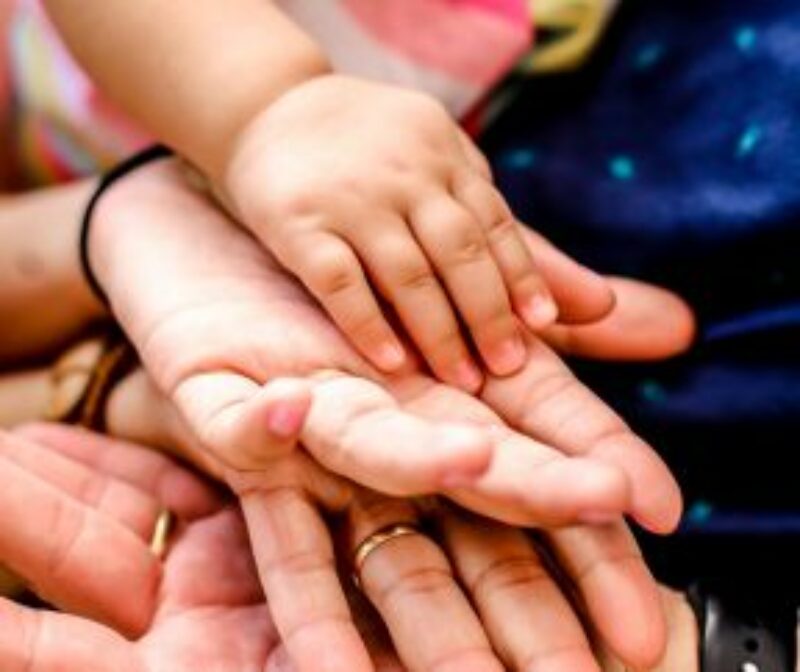
Eras: What do Taylor Swift and the church have in common? (Part 1)
What can the church learn from the success of the Eras tour? Part 1 of a 3-Part Series.

A Practice: Questioning Beliefs to find Meaning
This practice provides questions to help you explore the beliefs that help you make meaning of life's circumstances.

Learning Who We Are: We Can’t Do it Alone.
Think of a coin—it has two sides, heads and tails. In the same way, individuality and relationality can be thought of as two sides of the same coin.

Meaning Making (Part 2): What Does Spirituality Have to do with Meaning-Making?
In order to assign meaning we must believe in a bigger picture.

Meaning-Making (Part 1): The Power of a Meaning-Making Mindset
The practice of meaning-making involves exploring our belief systems, especially our beliefs around spirituality, which offer a distinct and powerful role in making meaning.

The Gift of Losing your Keys: A Story of Neurodiversity
Finding a good fit between our unique qualities and our environments helps us thrive.

Does your sense-of-self and narrative support healthy spirituality?
What is the story you tell yourself about your life? Does it help you or keep you from thriving?

Want to become more present, healthy, and connected? Pay attention to your body (Part 2)
Our emotions are linked to how we make meaning of our lives, and attending to our embodied emotional selves leads to spiritual health.

Want to become more present, healthy, and connected? Pay attention to your body (Part 1)
Thrive Fellow, Lauren Van Vranken, offers practices for reconnecting to our bodies and asks us to think about our relationship to our embodied selves.

Perfectionism: Turning a Struggle into a Superpower
Why do so many people struggle with perfectionism? Dr. Kenneth Wang explains.

Adolescents and Spirituality: How Transcendent Experiences can Create Resilient Teens
Research with Compassion International yielded results explaining the assets that come from spirituality across countries and challenges.

Living at the Intersection of Joy, Meaning, and Balance
Research indicates spirituality links meaning to joy, and may provide insight into the balance and purpose we seek.

The Divine Individuality of a Thriving Life
Our environments impact how we thrive. If our environments don’t support us, what can we do to support ourselves?

Rethinking Traditional Church for a Modern Age
Pamela King reflects on the church of her youth and how it deeply formed her identity, sense of purpose, and belonging.

Next Wave Spirituality: Thriving From Within and From Beyond
As the world continues to languish, Dr. Pamela King emphasizes the need for spirituality as a source of personal and societal transformation.

The Power of Storytelling: Shaping Future Generations with Our Past
Rodrigo Riveros discusses the importance of life stories in promoting brain development and meaning-making in adolescents.

Coping with Ambiguous Loss: Learning to Process Heartache We Don’t Understand
How can we make sense of loss and heartache? Guest blogger, Dr. Stephanie Trudeau, discusses ambiguous loss, sharing three ways we can cope with it.

Third Culture Kids During Quarantine: Adaptability and Purpose
Who are third culture kids, and what helps them adapt and find purpose?

On the Road to Healing: Meaning-Making and Beliefs
Dr. Stephanie Trudeau continues her discussion on loss, and how meaning-making and beliefs can guide us toward healing.

Light in Darkness: Not a Wholly Unprecedented Holy Week
Dr. Pam King explores how our beliefs can bring hope and light to our lives during dark, unprecedented times like COVID-19.

Ben Houltberg on Performance Based Identity
Ben Houltberg, associate professor of human development, reflects on his own journey away from over-identifying with his performance as an athlete, how performance-based identity can distort faith, and and his passion to help others learn to thrive. He was interviewed by Terry Hargrave, Evelyn and Frank Freed Professor of Marital and Family Therapy.

11 Warning Signs to Performance-Based Identity
Developmental scientist, Benjmain Houltberg outlines the warning signs that show whether an athlete suffers from performance-based identity.

Performance vs. Purpose
Benjamin Houltberg discusses the impact performance and success have on emotional wellbeing on the I Love Success Podcast.
38 Content Resources
A curated content list
Discover more about Thrive's research

Neurodiversity and Thriving: A Case Study in Theology-Informed Psychology
Citation Leidenhag, J., & King, P. E. (2023). Neurodiversity and Thriving: A Case Study in Theology-Informed Psychology. Studies in Christian Ethics, 36(4), 827–843. https://doi.org/10.1177/09539468231187784 Abstract The concept of ‘neurodiversity’ to speak of conditions such as autism, dyslexia, and others as differences, not disorders or pathologies, relies on a robust account of human flourishing that can incorporate these conditions. Conceptions of illness and well-being are always partially theological, whilst also having to be grounded in the empirical realities of the present time. Therefore, positive developmental psychology is a particularly apt field for developing a theology-informed psychology. This article argues that recent work in theology-engaged psychology of thriving, as opposed to subjective flourishing, is the best approach to securing a vision of well-being for neurodiverse persons. Copyright Year: 2024 Holder: SAGE Publications DOI: https://doi.org/10.1177/09539468231187784 …

Measuring Youth Perceptions of Being Known and Loved and Positive Youth Development: Cross-National Findings from Rwanda and El Salvador
Citation Tirrell, J. M., Dowling, E. M., Kibbedi, P., Namurinda, E., Iraheta, G., Dennis, J., Malvese, K., Abbasi-Asl, R., Williams, K., Lerner, J. V., King, P. E., Sim, A. T. R., & Lerner, R. M. (2023). Measuring Youth Perceptions of Being Known and Loved and Positive Youth Development: Cross-National Findings from Rwanda and El Salvador. Child & Youth Care Forum, 52(5), 1093–1119. https://doi.org/10.1007/s10566-022-09725-6 Abstract Background Dynamic, relational developmental systems-based models of development emphasize that developmentally-nurturant youth-adult relationships elicit in youth perceptions of being known and loved. Although such perceptions are foundations of positive youth development (PYD), such measures do not exist. Objective We sought to create a theoretically-predicated measure of youth perceptions of being known and loved by capitalizing on data sets in two countries (Rwanda and El Salvador) wherein a multi-national study of PYD was being conducted by Compassion International (CI). Method With…
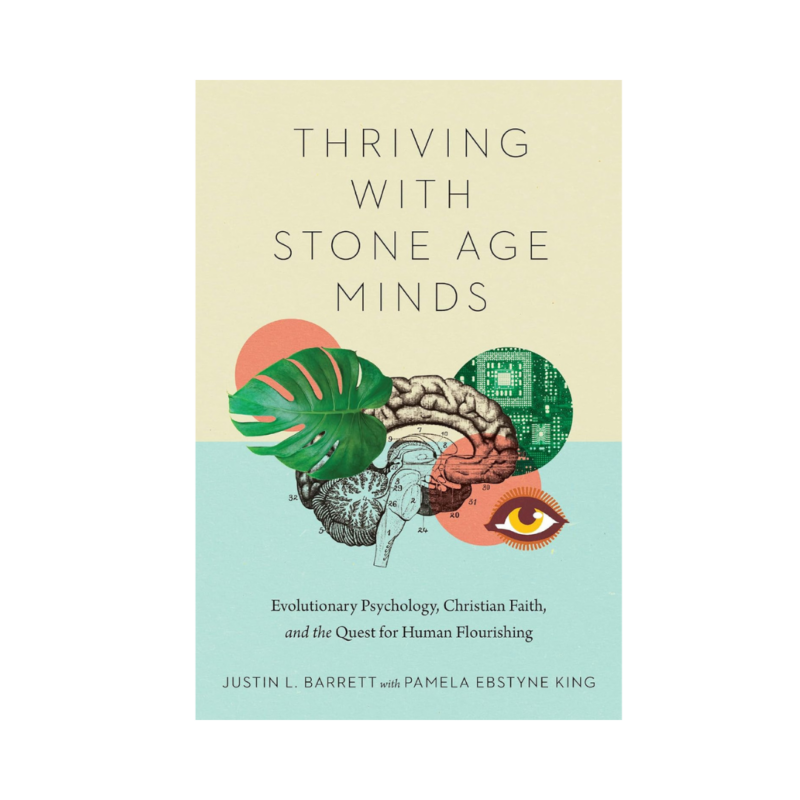
Thriving with Stone Age Minds: Evolutionary Psychological and Christian Perspectives on Human Flourishing.
Citation Barrett, J. L. (2021). Thriving with Stone Age Minds: Evolutionary Psychology, Christian Faith, and the Quest for Human Flourishing. InterVarsity Press. About the Author Justin L. Barrett (PhD, Cornell University) is the founder and president of Blueprint 1543 and adjunct professor of psychology at Fuller Theological Seminary, where he was formerly director of the Thrive Center for Human Development and chief project developer in the Office for Science, Theology, and Religion Initiatives. His books include Born Believers and Cognitive Science, Religion, and Theology. Pamela Ebstyne King (PhD, Fuller Theological Seminary) is the executive director of the Thrive Center and the Peter L. Benson Professor of Applied Developmental Science in the School of Psychology at Fuller Theological Seminary. She is co-author of The Reciprocating Self and co-editor of The Handbook of Spiritual Development in Childhood and Adolescence. About the Book What does God’s creation of humanity through the process of…

Developmental Perspectives on Adolescent Religious and Spiritual Development
Citation King, P. E., Hardy, S. A., & Noe, S. (2021). Developmental perspectives on adolescent religious and spiritual development. Adolescent Research Review, 6(3), 253-264. Abstract Despite the prevalence of religiousness and spirituality among adolescents, little is known about the psychology of adolescent religious and spiritual development. The purpose of this article is to explain how scholars within the discipline of developmental psychology have begun to approach the topic. Specifically, the article details how developmental theory advances understanding of religious and spiritual development and overviews developmental methods that enable rigorous examination of the structure and function of adolescent religious and spiritual development. A Relational Developmental Systems metatheoretical approach, emphasizing longitudinal methods, is utilized to highlight ideographic and nomothetic aspects of adolescent religiousness and spirituality. Examples of theoretically and methodologically cutting-edge developmental research provide illustration. In conclusion, the article shows that developmental psychology provides insight toward a comprehensive approach to the study…
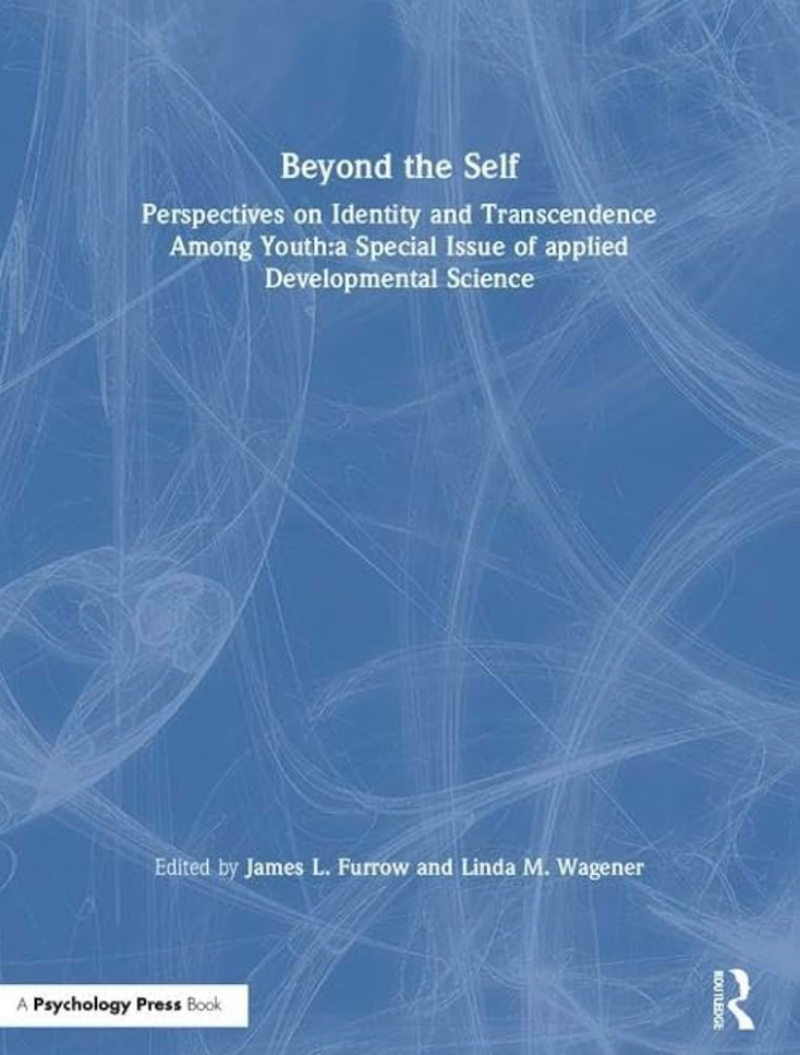
Religion and identity: The role of ideological, social, and spiritual contexts
Citation King, P. E. (2019). Religion and identity: The role of ideological, social, and spiritual contexts. In J. L. Furrow & L. M. Wagener (Eds.), Beyond the Self (pp. 197-204). New York: Routledge. Abstract Beyond the Self grew out of a conference of developmental scientists who examined the ways that young people were developing understandings of self that anchored youth to something larger than their own personal competencies and success. Each of the papers drew on the question of how one locates the formation of identity within the scope of different transcending demands or influences. This special issue is organized into three parts–moral, civic, and cultural and religous identity–but are not exclusive in their focus on these themes as many of the sections provide a more integrated view of human development. In sum, these articles recognize that the search for identity and purpose within adolescence is informed by a multiplicity…

Toward a Measure for Assessing Features of Effective Youth Development Programs
Citation Tirell, J.M., Dowling, E.M., Gansert, P., Buckingham, M., Wong, C.A., Suzuki, S., Naliaka, C. Kibbedi, P., Namurinda, E., Williams, K., Geldhof, G.J., Lerner, J.V., King, P.E., Sim, A., & Lerner, R.M. (2019). Toward a measure for assessing features of effective youth development programs: Contextual safety and the “big three” components of positive youth development programs in Rwanda. Child & Youth Care Forum, 48(5), 1-22. Abstract Background When delivered in a safe space, programs effective in promoting positive youth development (PYD) involve key features termed the Big Three: (1) Positive and sustained adult–youth relationships; (2) Life-skill-building activities; and (3) Opportunities for youth contribution and leadership. However, no measures exist in the literature for assessing the Big Three. Objective The present study sought to develop a quantitative measure of program quality. Method Using data collected from Rwandese participants from the Compassion International (CI) Study of PYD, we developed a youth-report measure…

The End of the Beginning: Evidence and absences studying Positive Youth Development in a global context
Citation Lerner, R. M., Tirrell, J. M., Lerner, J. V., Geldhof, G. J., Gestsdottir, S., King, P. E., Sim, A. T. R., & Dowling, E. (2018). The end of the beginning: Evidence and absences studying PYD in a global context. Adolescent Research Review, 4(1), 1-14. Abstract Relational developmental systems metatheory frames many contemporary models of human development, including two strengths-based approaches to enhancing the lives of diverse children and adolescents, the positive youth development (PYD) perspective and resilience science. Both approaches emphasize the potential for plasticity in human development, and the systematic changes that arise through mutually influential relations between the individual and the multiple, integrated levels of the dynamic developmental system. After discussing the similarities and differences in these two approaches, different models of PYD are discussed in relation to how descriptions, explanations, and attempts at optimizations of the development of diverse youth are enacted within these conceptions. The…
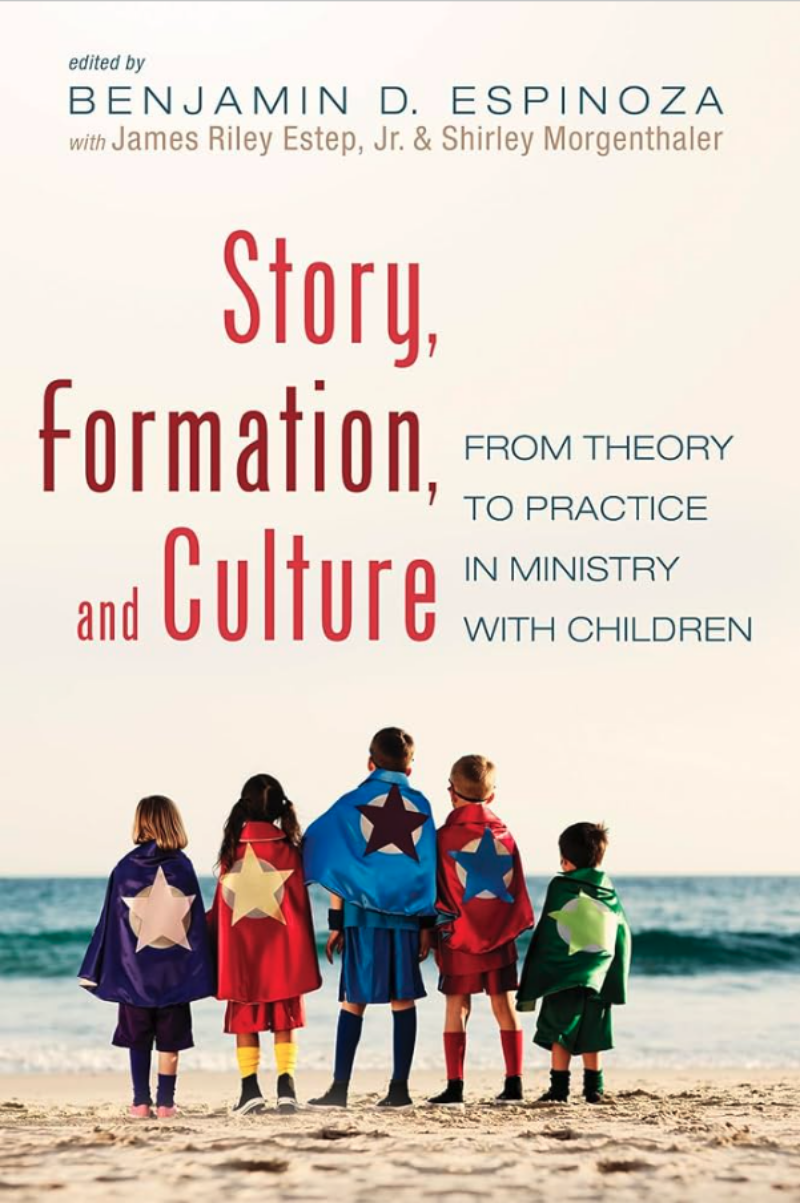
Kids & God: Nurturing spirituality and the ability to thrive
Citation King, P. E. (2018). Kids & God: Nurturing spirituality and the ability to thrive. In Benjamin D. Espinoza, James Riley Estep & Shirley Morganthaler (Eds.) Story, Formation, and Culture: From Theory to Practice in Ministry with Children. Eugene, OR: Wipf & Stock Press, 296-306. Abstract Story, Formation, and Culture brings together a myriad of scholars, researchers, and ministry leaders into conversation about how we can effectively nurture the spirituality of children. Built around the three themes of story, formation, and culture, this volume blends cutting-edge research and insights with attention to how we can bring theory into practice in our ministries with children. The work of children’s spiritual formation is often a marginalized component in the church’s overall ministry. This volume seeks to equip pastors, leaders, and scholars with cutting-edge research and practices that effectively strengthen their ministries with children. Copyright Year: 2024 Holder: Wipf and Stock Publishers DOI:…
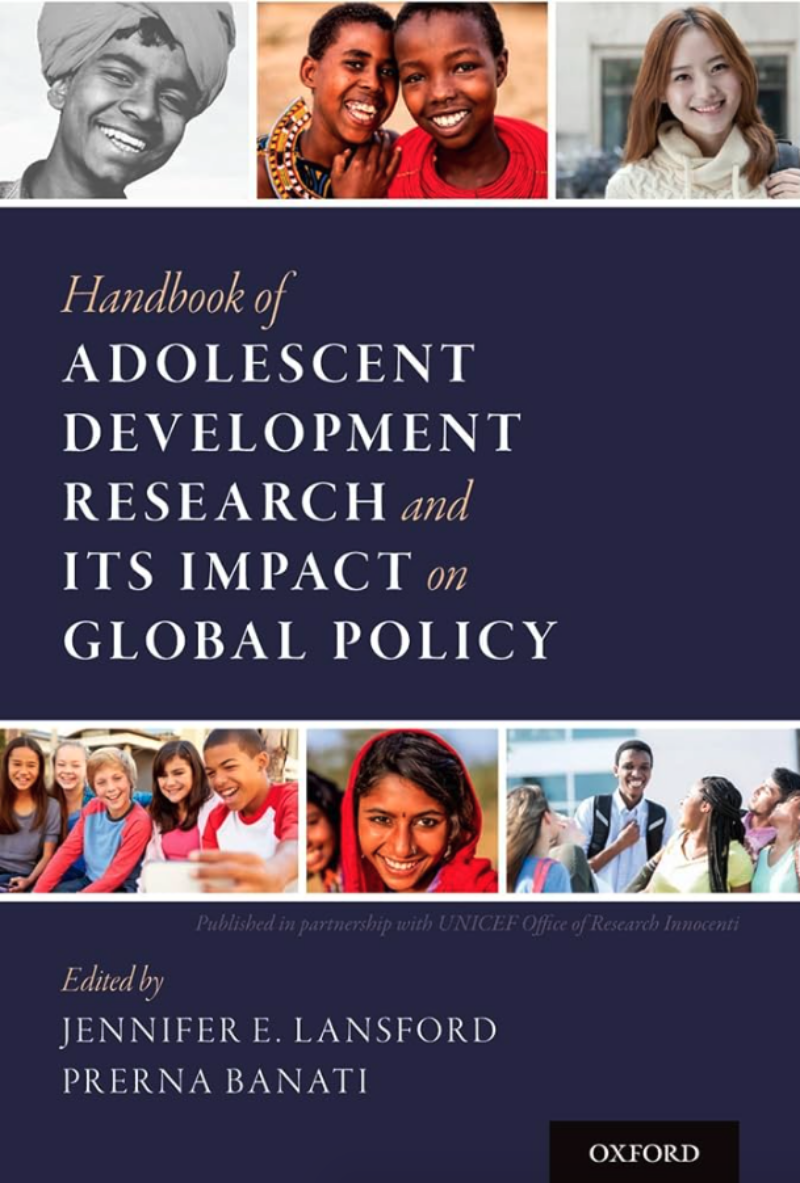
Studying Positive Youth Development in Different Nations: Theoretical and Methodological Issues
Citation Lerner, R. M., Lerner, J. L., Geldhof, G. J., Gestsdottir, S., King, P. E., Sim, A. T. S., Batanova, M., Tirrell, J. and Dowling, E. (2018). Studying positive youth development in different nations: Theoretical and methodological issues. In Lansford, J., & Banati, P. (Eds.) Handbook of Adolescent Development Research and Its Impact on Global Policy. New York: Oxford University Press. Abstract International interest is growing concerning using strength-based models of adolescent development to understand how mutually influential relations between individuals and their key settings may be a basis for positive, healthy development. Bidirectional relations models are linked to relational developmental systems (RDS) metatheory, with a focus on the positive youth development (PYD) model, the most used ininternational PYD-related research and programs. A three-nation, counterfactual, comparative, longitudinal study is described to understand if Compassion International programs enhance thriving of the world’s poorest youth. RDS metatheory ideas point to the need…

Mind the gap: Evolutionary psychological perspectives on human thriving.
Citation King, P. E., Barrett, J. L., Greenway, T. S., Schnitker, S. A., & Furrow, J. L. (2018). Mind the gap: Evolutionary psychological perspectives on human thriving. The Journal of Positive Psychology, 13(4), 336-345. Abstract The amount of psychological literature focusing on human thriving and flourishing has grown in recent years, but this topic is currently subject to much conceptual ambiguity. Evolutionary psychology, though often not included in discussions on optimal human development, provides a framework that benefits considerations of human thriving. Humans exhibit a high degree of niche construction by which they alter their environment, in turn affecting their offspring. Such niche construction is enabled by unique human capacities, but these same capacities are then required to ‘mind the gap’ between human nature and the altered environmental niche. As such, thriving may in part be understood as the ability of the individual to navigate difficulties resulting from a mismatch…

Varieties of social experience: The religious cultural context of diverse spiritual exemplars
Citation King, P. E., Abo-Zena, M., & Weber, J. (2017). Varieties of social experience: The religious cultural context of diverse spiritual exemplars. British Journal of Developmental Psychology, 35 (1), 127-141. Abstract From cultural developmental and relational developmental systems perspectives, the current study employed an exemplar research design along with qualitative content analysis to gain deeper understanding of how adolescents perceived the social influences on their religious and spiritual development (RSD) among religiously and culturally diverse youth. The sample included interviews of 28 highly spiritual youth aged 12–21 years (M = 17.73 years) from six countries and eight different religious traditions. Analysis revealed that 96% of participants reported multiple relational influences on their RSD and that these persons impacted their religiousness and spirituality through various processes such as teaching and encouragement. Portions of the narrative are presented to reveal how the meaning and influence of these interactions are informed by cultural…
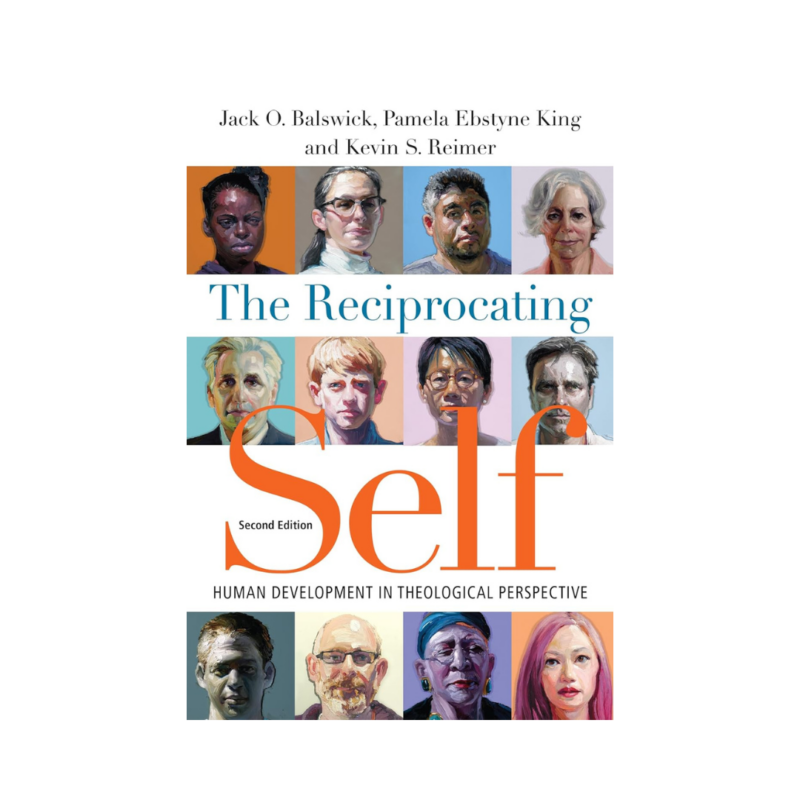
The Reciprocating Self: Human Development in Theological Perspective
Citation Balswick, J. O., King, P. E., & Reimer, K. S. (2016). The reciprocating self: Human development in theological perspective. InterVarsity Press. Abstract On the basis of a theologically grounded understanding of the nature of persons and the self, Jack O. Balswick, Pamela Ebstyne King and Kevin S. Reimer present a model of human development that ranges across all of life’s stages: infancy, childhood, adolescence, young adulthood, middle adulthood and elder adulthood. They do this by drawing on a biblical model of relationality, where the created goal or purpose of human development is to become a reciprocating self―fully and securely related to others and to God. Along the way, they provide a context for understanding individual development issues―concerns, tensions, worries or crises encountered by the self in the context of change. Awareness of these issues is most pronounced at developmental transitional points: learning to talk and walk, beginning to eat…

Religious and Spiritual Development
Citation King, P. E. & Boyatzis C. (2015). Religious and spiritual development. In M. E. Lamb & C. G. Coll (Eds.), Social and Emotional Issues (Vol. 3) of the Handbook of Child Psychology and Developmental Science (7th ed.). Editor-in-chief: R. M. Lerner. Hoboken, NJ: Wiley, p. 975-1021. Abstract Although religion and spirituality have long been an integral part of being human, this is the first empirical chapter to be included in the Handbook of Child Psychology. We examine major theoretical perspectives but emphasize the recent explosion of empirical findings on religion and spirituality in childhood and adolescence. Recognizing the centrality of bidirectional relationships between young persons and their context that contribute to religious and spiritual development, we advocate for an understanding of reciprocating spirituality. Within the chapter, we examine how children and adolescents develop in religiousness and spirituality in the context of proximal and more distal relationships. The chapter offers…

What’s the “Positive” in Positive Psychology? Teleological Considerations Based on Creation and Imago Doctrines
Citation King, P.E. & Whitney, W. (2015). “What’s the ‘positive’ in positive psychology: Teleological considerations based on creation and imago doctrines,” Journal of Psychology and Theology 43(1), 47-59. Abstract While positive psychology has considered a social science perspective of optimal development and living, a pressing question for the integration of psychology and theology is to consider what Christian theology suggests is essential for humans to thrive. Recognizing that God’s purposeful action in creation has a telos, that is, a goal or purpose for humankind, propels Christian psychologists to investigate a theology of thriving in order to more fully grasp what God has intended for humanity. In this essay we argue that the Christian faith uniquely contributes multiple perspectives to our understanding of human thriving and flourishing that are central to psychological inquiry and are unique contributions to positive psychology. Specifically, the doctrines of creation and imago Dei broaden and deepen…

Self-Narratives and Emotional Health among Elite Athletes
Ben Houltberg and scholars examine the role of self-narrative profiles in elite athletes' wellbeing.

Thriving Conversations in Clinical Practice
This pilot program by James Furrow promotes initiative and self-confidence in at-risk youth.
16 Content Resources

Get Started
Learning who we are: we can’t do it alone.
Think of a coin—it has two sides, heads and tails. In the same way, individuality and relationality can be thought of as two sides of the same coin.
Dive Further

Ethics & Virtues
Our beliefs about love and how we live out love through values, views of right and wrong, and cultivating virtuous habits.

Vocation & Purpose
Contributing our strengths to the world by living out our response to love.

Relationships & Community
Connections provide a space of belonging where we can be fully known to ourselves and others and learn to give and receive love.

Habits & Rhythms
Healthy spiritual practices and regular rhythms allow us to slow down to gain insight, connect to love, and energize into purposeful endeavors.

Transcendence & Spirituality
Awareness of and connection to a source of invigorating love inspires purpose. For many this is God, for others it may be a higher power or nature.